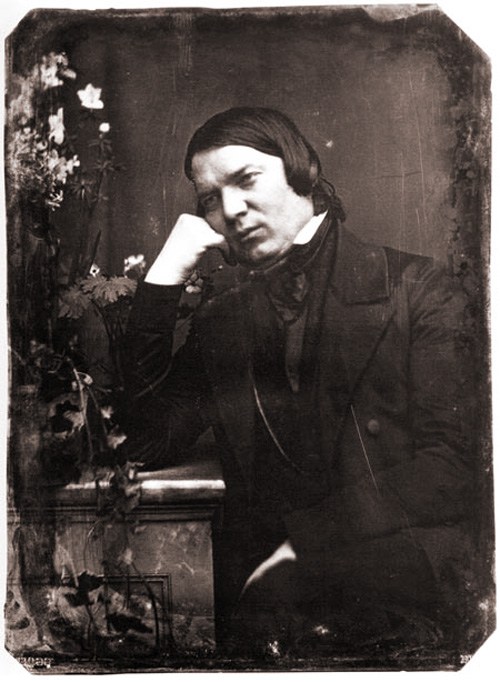Classical Music's Most Tragically Romantic Love Triangle
In the early 1850s the most famous classical musical couple in the German speaking world were the Schumann’s. Robert was a composer and editor/writer of the first musical periodical in history, the Neue Zeitschrift fur Musick (trans. ‘New Journal of Music). Clara was a great composer in her own rite and one of the most successful concert pianists of her generation. Together they had 7 children and devout romance.
Robert Schumann.
The Young Eagle from the North
One day in 1853, a young man presented himself at the Schumann’s home. He brought a letter of endorsement from the greatest violinist of the day, Joseph Joachim, who was a dear friend of the Schumann’s. The “young eagle from the North,” as Schumann called him, was none other than the 20-year-old Johannes Brahms.
Robert invited the young pianist/composer into his home and asked if he would play some of his compositions. As the youngster began playing his 1st Piano Sonata, Robert was amazed. He ran and found Clara. The two continued listening as Brahms played for them. Schumann said that Brahms was a “darling of the Muses.”
Robert promptly wrote an impassioned piece in his magazine about Brahms, prophesying his future fame.
Immensely grateful, Brahms wrote to Robert, “You have made me so extremely happy that I cannot attempt to express my thanks in words. May God grant that my works will soon be able to prove to you how much your love and kindness have uplifted and inspired me.” (Letters of Clara Schumann and Johannes Brahms).
The Schumann’s welcomed Brahms into their home where he lived for several months. Robert mentored him and shared his vast library of early music where Brahms became intoxicated with composers of the past. This was very uncommon at the time. Most musicians focused on music of the present day and neglected the past. Robert instilled a life-long love of studying the great old masters and using their techniques in new works.
Clara Schumann and a young Johannes Brahms.
Suicide Attempt
Only four months after their meeting, Robert suffered a nervous breakdown. On February 27, 1854, he jumped off a bridge into the Rhine river in a suicide attempt. He was rescued from drowning and was committed to a private psychiatric institution. He spent the next two years there and died on July 29, 1856.
During Robert’s confinement, Clara and Johannes began what would become a lifelong correspondence. He grew to be her closest and most beloved friend, despite being 14 years his senior. He became her sole source of light and their friendship took on a new dimension.
Brahms was torn by his growing love for his sick mentor’s wife. He wrote to her in 1855 saying:
"I can do nothing but think of you... What have you done to me? Can't you remove the spell you have cast over me?"
Clara’s feelings were a tangled mess too. She yearned for her husband, but as he grew worse in his sickness, she became more and more fond of her young friend. In a letter to her children, Clara wrote:
“You hardly knew your dear Father, you were still too young to feel deep grief, and thus in those terrible years you could give me no comfort. Hope, indeed, you could bring me, but it was not enough to support me through such agony. Then came Johannes Brahms. Your Father loved and admired him, as he did no man except [the violinist Joseph] Joachim. He came, like a true friend, to share all my sorrow; he strengthened the heart that threatened to break, he uplifted my mind, he cheered my spirit when[ever] and wherever he could; in short he was my friend in the fullest sense of the word.”
Love Letters
After Robert’s death, Clara threw herself into her performing career. She performed all over Europe and supported her 7 children as a concert pianist. She performed Robert’s compositions continuously to ensure he would be remembered and to carry on the legacy of his genius. She also composed the works of her new young friend and confidant.
On 3 December 1861 Brahms conducted his 1st Piano Concerto with Clara as solo pianist. She wrote in her diary "I was certainly the happiest person in the whole room ... the joy of the work so overcame me."
The 2nd movement, depicted in the video here, is particularly beautiful. One wonders if Clara herself was the subject of the movement. The sentiments of this romantic movement are similar to a letter Brahms had written to Clara:
"Clara, dear Clara… I feel ever more happy and peaceful in my love for you. Every time I miss you more but I long for you almost with joy. That is how it is. And I knew the feeling already but never quite so warm as it is now.
“I wish I could write to you as tenderly as I love you and tell you all the good things that I wish you. You are so infinitely dear to me, dearer than I can say. I should like to spend the whole day calling you endearing names and paying you compliments without ever being satisfied.”
Her affection was often returned with many tender comments such as this, from a letter in 1858:
"I am waiting for another letter, my Johannes. If only I could find longing as sweet as you do. It only gives me pain and fills my heart with unspeakable woe. Farewell! Think kindly of Your Clara.
Write me as often as you can. One requires to be cheerful during a cure and whence would good cheer come to me if not from you?”
As the years progressed, their affection only deepened. At one time they considered marrying, but it never happened. They even went on holiday together to Switzerland to sort it all out. It’s impossible to know what happened exactly, but they did not wed and Brahms moved to Hamburg thereafter.
“There are more ironies in this first and greatest, if not precisely last, love of Brahms's life. If he would not marry Clara, neither would he marry anybody else - in his heart he could never leave Clara, nor she him. For the rest of their lives they would maintain their strange but inescapable connection. They spent holidays together. They hugged and kissed.
Their love may never have been consummated. This may seem absurd. But these were different times: no birth control, lots of disease. Proper women shunned affairs. In later years Brahms told an acquaintance that he had never compromised a respectable woman, and for him the definition of a respectable woman was Clara. He once described the aged Clara to a friend thus: "Virginal as ever." (Jan Swafford, The Guardian).
Always Seeking Her Approval
Brahms could hardly feel confident in a new composition without the approval of his greatest friend. He would send off manuscripts to her considering publication only after he had her approval.
Old Brahms at the piano.
At the end of his life he dedicated several of his pieces to her.
Op. 118 is a set of 7 short piano pieces classified as “Character Pieces.” Robert Schumann wrote many of his piano pieces in this category. As his faithful protege, Brahms followed his mentor’s lead throughout his life. In the last few year of his life, he wrote 4 sets of Character Pieces back to back. Ops. 116-119. Each is a set of beautiful, charming works for solo piano.
Op. 118 is dedicated to Clara. The 2nd of 7 movements is perhaps the most famous Character Piece Brahms ever composed. To my ears it is filled with all the tender love, devotion and affection Brahms had for his dear old friend and love. Here is a beautiful recording by the young pianist Arthur Jussen. I can just see in him the young Brahms becoming intoxicated with the Schumann’s in all the complicated internal levels of their relationships.
Until the End
In March of 1896 Clara suffered a stroke and died. Brahms felt her loss deeply. His own health began to fail shortly thereafter and 11 months after Clara passed, Brahms followed her.
During those last few months, Brahms composed his final set of art songs for baritone and piano, the Four Sacred Songs, Op. 121, set to biblical texts contemplating the end of life and what comes in and after death.
The 3rd song, “O Death, How Bitter You Are,” begins with a stern and bitter cry. But by the 3rd verse, death becomes sweet. Skip ahead to the 1:16 mark to hear this heart-felt verse. You can hear old Brahms longing for his dear friend through the veil, wishing to join her, welcoming his own demise so as to be reunited with her.
Tragic Romantics
During our concert next week, we will perform works by Schumann and Brahms.
The Schumann “Konzertstuck” for 4 French Horns and Orchestra is a delightful bright piece.
But the work we will play by Brahms, his “Tragic Overture,” though it has no particular story, portrays to my ears, all the complications of his tangled love for Clara and reverence for his mentor Robert.
You can read more about these pieces in the program notes during the concert. But I wanted to make sure you knew the story behind the composers. One of the special aspects of music is that we get to inhabit the mind and heart of the composer many years after their death. We can experience a part of their life as freshly as if we had witnessed it or experienced it ourselves. We’re so lucky to have these shadows of their experience left behind so that we can experience what they did and have our lives impacted by the greatness of their genius and the stories and lessons of their lives.
We look forward to seeing you at our concert in less than 2 weeks. Join us on September 28th and 29th, 7:30pm at Timberline Middle School in Alpine, UT.
Tickets are available by click on the button below.
We’ll see you soon at the Symphony!
Sincerely,
Dr. Douglas Pew
Associate Conductor
Timpanogos Symphony Orchestra
www.thetso.org
www.douglaspew.com




